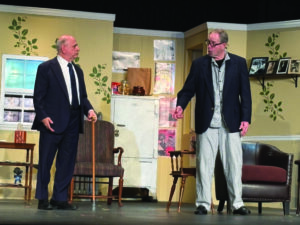The combination of the pandemic and historic global inflation is expected to hit local governments and their taxpayers particularly hard in the coming year, and the City of Falls Church is no exception. So the F.C. Council was cautioned at its last official meeting of 2022 this week.
Sharp rises in residential property values is a singular manifestation of these wider effects on the Little City, and the Council’s aspirational guidance for the coming budget year is limited to no new tax hike or cut and no new debt, and no “off the cliff” increase, as had been feared, in the City’s share of subsidizing WMATA.
The expected 4.2 percent revenue growth, not as much as the 6.3 percent growth last year but still strong, is calculated into these aspirations for the Fiscal Year 2024 City and school system budgets that the governing bodies will begin crafting in earnest next month.
Council member Letty Hardi noted that the 4.2 percent revenue growth of the past year “has been very solid,” and that a starting point for moving forward should be aimed at “keeping that organic revenue growth going.”

The City’s chief financial officer, Kiran Bawa, said she was in a meeting with the City’s real estate assessor Erwving Bailey, now in his second year here, just days earlier for a “progress report” on how real estate values are trending in the City, She noted that the City will get its numbers on economic activity for the second quarter (Oct.-Dec.) of the current year in early February and that Bailey will deliver his annual assessments of all real estate properties in the City in early February.
While the coming year may prove relatively difficult for taxpayers, despite Council resolve not to increase the tax rate, the years after that will begin to reap the benefits of the dense commercial development now happening the City’s West End and at Broad and Washington, both of which are now progressing below multiple towering construction site cranes. Once fully operational, those sites, plus others in the pipeline, should result in the resumption of lowered tax rates for City residents even greater than the cuts from $1.355 to $1.23 per $100 of assessed valuation of the last two years.
One upbeat local developer told the News-Press recently that he predicts the tax rate will eventually fall below $1.
But the biggest challenge on the expenditure side of the ledger will be coming in the form of employee compensation, guided by the findings of an exhaustive 2022 Classification and Compensation Study completed and reported on at Monday’s meeting by City Human Resources Director Steve Mason and Mark Holcomb of Evergreen Solutions.
The study found that the City’s rate of compensation to employees is slightly below average for the region, and it would cost about $253,000 to bring it up to the regional average, also taking into account the need for more parental leave.
In that context, another major challenge before the Council is in the area of affordable housing, and even beyond that, in addressing the issue of homelessness. The projected budget for the upcoming year includes only $100,000 to go into the Affordable Housing Strike Fund.
But, this week the new mayor of Los Angeles, Calif., declared a State of Emergency to address the homeless crisis, and while there is not a lot of evidence of a severe homeless issue right in Falls Church, it can be expected to close in on the community in one form or another.
This Monday, the Council was challenged to address the problem by Meridian High School junior Charles VanHorn, who urged the Council to press Richmond for more funding for affordable housing construction, rental assistance and social services, the latter needed to deal with such collateral issues as addiction and domestic violence.
“With this money, the City should take a housing-first approach to homelessness” he said, which focuses on “getting people housed as quickly as possible without any prerequisites.” He said that the “housing first” approach has worked in Houston, Texas, which saw an over 50 percent decrease in homeless people with this method.”
To more effectively accomplish this, he suggested, “the City should improve a ‘continuum of care’ and facilitate cooperation between non-government organizations and the local government.”
The Council learned that going into the next budget cycle, the City is enjoying solid financial buffering, with $19 million (out of a total annual operating budget of just over $100 million) being held currently in an “unassigned fund balance” and another $12 million in a capital reserve fund.













